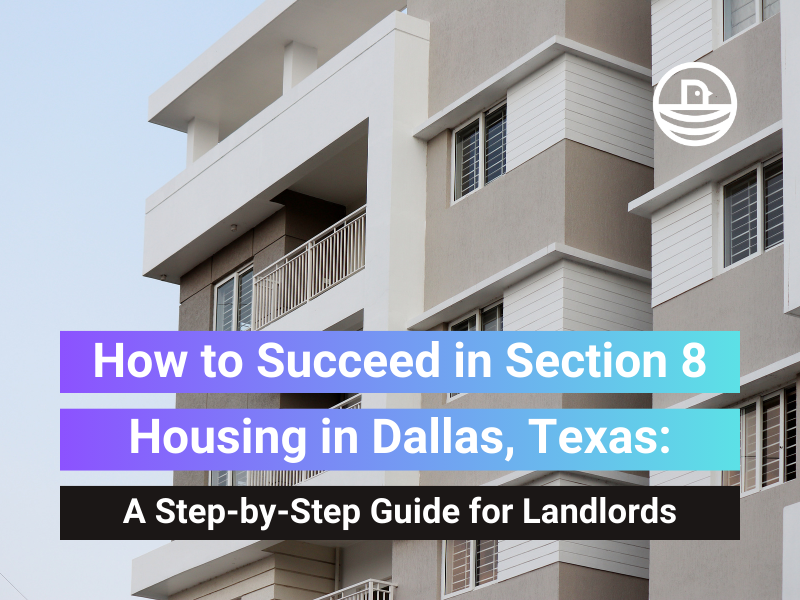The Texas Section 8 Housing program helps low-income families, disabled individuals, and seniors find affordable housing options—whether a rental property or a home. Officially known as the Housing Choice Voucher (HCV) Program, Section 8 Dallas participants can live in single-family homes, apartments, or townhouses that meet certain requirements.
The program starts with the U.S. Department of Housing and Urban Development (HUD), which gives federal funds to public housing agencies (PHAs). These agencies distribute vouchers to participants based on where they live. After receiving vouchers, Texas Section 8 participants can find housing options that meet their needs. Section 8 Dallas housing units must follow certain rules to make sure people have an adequate place to live.
If you’re asking yourself, “How do I become a Section 8 landlord in Dallas, Texas?” you’ve come to the right place. Here, we’ll discuss Texas Section 8 housing, specifically in the Dallas market. You’ll learn about the eligibility requirements to become a Section 8 Dallas landlord, gain tips for participating in the program, and understand whether it’s something you’re interested in pursuing.
Benefits for Section 8 Housing Dallas Landlords
If you’re wondering “Do landlords have to accept Section 8 in Dallas, Texas?” the answer is no—it’s your choice. However, if you become a Section 8 landlord in Dallas, Texas, it can be beneficial, especially as the housing market here continues to rapidly expand. For example, you’ll receive monthly payments from the government, which can be helpful if you own C-class or D-class properties in areas like Pleasant Grove, South Dallas, and Oak Cliff.
Tenants using the Section 8 Dallas program are pre-screened, meaning they have stable jobs, good rental histories, decent credit scores, and no felonies or evictions on their record. The Texas Section 8 program often leads to lower tenant turnover and fewer missed payments. Plus, there’s often a waiting list of people ready to use Section 8 Dallas vouchers as soon as there’s an opening, so vacancies are less of a worry. By choosing to become a Section 8 landlord in Dallas, Texas, you not only get a steady income, but also help people in need.
Understanding how to be a Section 8 landlord in Dallas, Texas also means being aware of potential challenges, like getting approved by your local PHA and passing inspections. Your rental rate will also need to be around the same price as other properties in the area, but you won’t have to compete with prices in luxury areas like Uptown and the Arts District.
You may face discrimination from nearby neighbors or other tenants who aren’t part of the Section 8 Dallas program, which can be difficult to deal with. Understanding what it takes to become a Section 8 landlord in Dallas, Texas can help you handle these challenges and enjoy the program’s rewards.
How to Become a Section 8 Landlord in Dallas, Texas
The process to become a Section 8 Landlord in Dallas, Texas starts with attending a Landlord Briefing Session, held by the Dallas County Housing Agency (DCHA). These meetings are mandatory, and reservations are required. You can access the list of Section 8 Dallas briefing dates for 2024 through the DCHA’s website. After the briefing, you’ll submit a Landlord Request Form, along with these required documents:
Proof of ownership in the form of a Deed of Trust
W-9
Contract Management Agreement, if applicable
Proof of registration, if applicable
Once approved, you’ll sign the Housing Assistance Payment (HAP) contract and can begin renting to Section 8 Dallas tenants.
Eligibility Requirements for Dallas, Texas Landlords
To become a Section 8 landlord in Dallas, Texas, you’ll need to meet certain Housing Quality Standards (HQS). These standards ensure your property is “decent, safe and sanitary.” The HQS checklist for Section 8 Housing in Dallas can be found here.
The Dallas Housing Authority (DHA) handles day-to-day operations for Section 8 Housing in Dallas. They’re the 10th largest PHA in the country, serving over 55,000 residents from seven different counties. Not all rental properties qualify for the Section 8 Dallas program. Properties allowed to join include multi-family apartments, duplex or single-family detached homes, condominiums, townhomes, and mobile homes.
Under Section 8 Dallas rules, your property must pass an initial inspection and will then be inspected regularly every one to two years. To prepare, ensure all utilities are turned on, appliances are working, and repairs are made before the inspector shows up. Repairs will be required if any issues are found during Texas Section 8 inspections.
Sometimes, Section 8 Dallas inspectors may suggest updates like a new HVAC system to keep up with Dallas’ humidity and heat, along with upgraded appliances and safety enhancements. Keeping your property in good shape will help you stay in the Section 8 Housing Dallas program.
Managing Your Section 8 Rental Property
.png)
In order to handle Section 8 Housing in Dallas, Texas, landlords must keep up with the rules. Why? If you become a Section 8 landlord in Dallas, Texas, you can face consequences if you don’t meet certain standards.
When Section 8 Dallas tenants report concerns in their units, it’s important to take care of them quickly, as you could lose rent payments until these repairs are made. Not following HQS standards could also mean removal from the Section 8 Dallas program.
In Texas, the weather can be unpredictable, making the Texas Section 8 program more challenging. In February 2021, Dallas experienced a deep freeze, causing power outages and burst pipes. In May 2024, Dallas faced strong winds and hail, leading to roof leaks, shattered windows, and broken HVAC units in many Section 8 Dallas properties. Having emergency plans in place as a Section 8 Dallas landlord can help you manage these obstacles.
The DHA handles Texas Section 8 rent payments, splitting them between themselves and the tenants. Tenants normally contribute around 30% of their income toward rent, and the DHA covers the rest.
If you have issues with Texas Section 8 rent payments, speak with the tenant and the DHA to make sure everyone is following the HAP contract. If the situation goes unresolved, file a complaint with HUD and consider legal action to recover unpaid rent. If payments still aren’t made, you may be able to end the lease and evict the tenant under Texas Section 8 law.
Become a Section 8 Landlord in Dallas, Texas
Becoming a Section 8 Dallas landlord can give you a steady income while helping those in need. However, it requires you to stay on top of regulations and maintain your property. While the process may seem like a lot to manage, the benefits of the Section 8 Dallas program are often worth your efforts.
If keeping up with Section 8 Housing Dallas requirements feels too hard to handle on your own, consider hiring a property manager like Evernest. We’ll handle everything for you—from finding tenants to managing repairs. That way, you can enjoy passive income and the peace of mind that comes with knowing you’re in expert hands.


